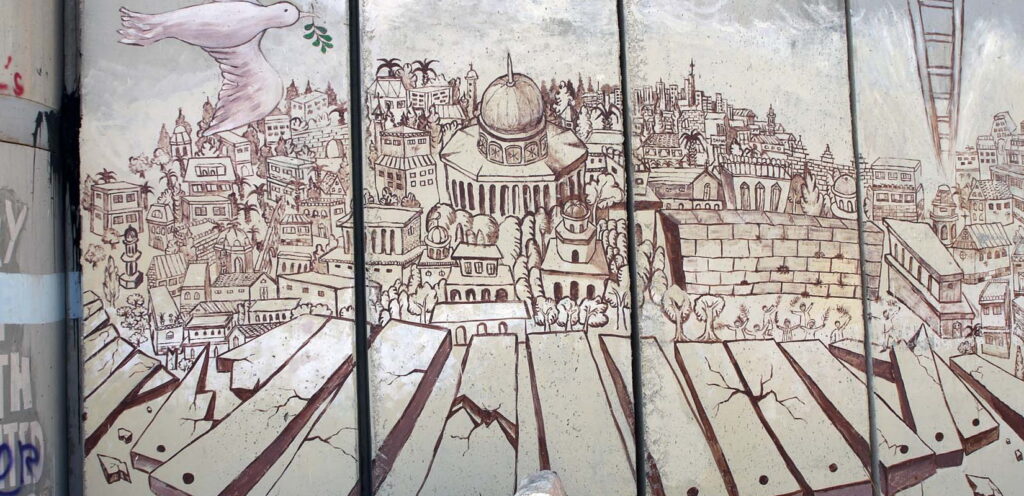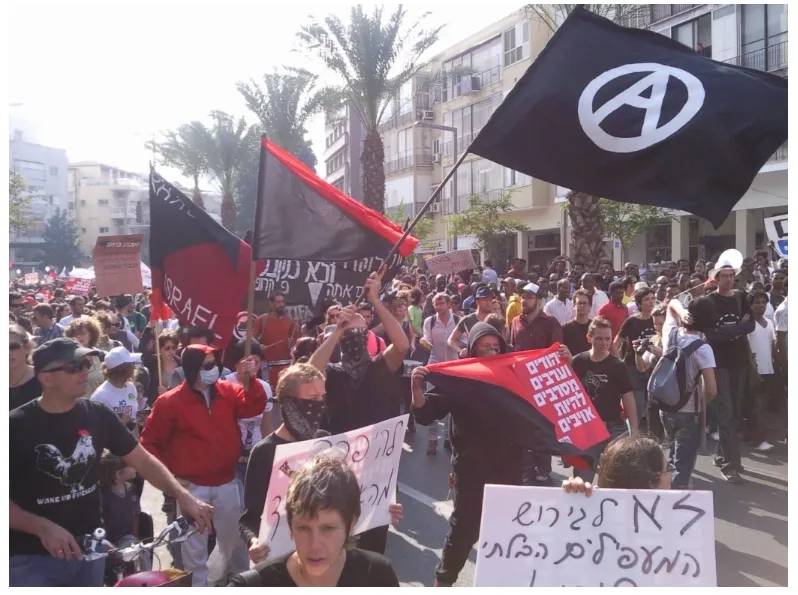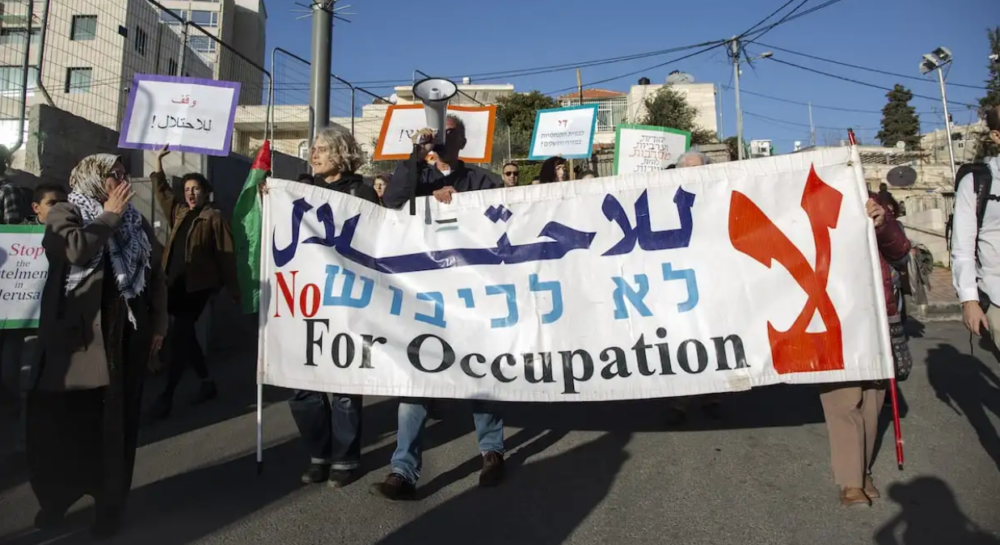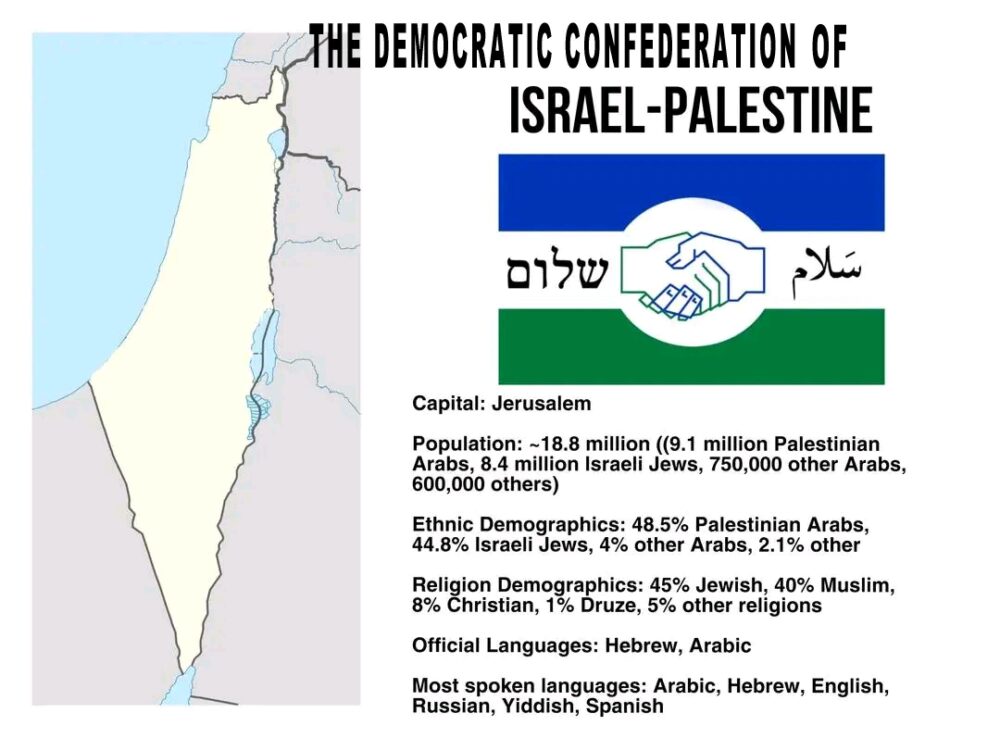Voices for an Israel-Palestine Confederation

Written by Yavor Tarinski. Republished from Aftoleksi.
Democratic confederalism is the contrasting paradigm of the oppressed people.
~ Abdullah Öcalan in Prison Writings: Roots of Civilisation
The bombing and invasion of Gaza continues in full force, bringing death and destruction to countless civilians. These attacks should immediately stop, the siege of Gaza must be lifted and the apartheid on the West Bank must be dismantled. All this, as well as any jihadist project and, of course, any form of anti-Semitism, should be actively rejected and replaced by a real guarantee of peace – as revolutionary voices have been saying for years, by restructuring the region along federal or confederal lines.
Since the very beginning there were voices within Jewish and Palestinian peoples that opposed the creation of nation-states, proposing instead the formation of an Israeli-Palestinian confederacy – movements like the Jewish Labor Bund and Arab-Palestinian intellectuals like Al-Khalidi. They proposed the cantonisation of the region so that both people can be allowed peaceful coexistence. Later on, this secular and democratic vision was further developed by the council-socialist organization Matzpen, whose members supported the form of regional union, consisted of cantons that allow for self-determination of each ethnic group, rather than one or two homogenic Nation-State(s).
And although nowadays such voices are further marginalized by jihadists and far-right zionists, you can still hear advocates for a coexistence-based resolution of the conflict. A more recent case was the anarchist federation Ahdut/Wihda, which consisted of antiauthoritarian activists from Israel and occupied Palestine, calling both peoples to a common struggle towards a future where instead of one or two nation states, a new form beyond national identities, based on freedom, equality and solidarity, will be established and further spread in the Middle East.

Demonstration by Israeli-Palestinian anarchist federation Ahdut/Wihda
Another recent voice in this direction is author Abraham Weizfeld, who suggests in his book The Federation of Palestinian and Hebrew Nations (2018) that the notion of Nation-State must be avoided by a No-State Solution, expressed through parallel civil societies that become an organic social construction codified in a federal constitution.
Another contemporary voice for Israeli-Palestinian co-existance is Palestinian writer Ahmed Moor, born in the Rafah refugee camp in the Gaza Strip. Co-author of After Zionism: One State for Israel and Palestine (2012), he proposes the cantonization of the region into four federal units: Gaza, the West Bank, the Galilee and Coast, and the Naqab or Negev. Two of these units will be majority-Palestinian, while the other two, majority-Jewish, as a likely necessary concession to the country’s legacy of ethnic conflict. Moor suggests that in this vision power will be distributed on a proportional basis, while each federal unit may exercise limited decision-making authority on certain matters. For Moor such confederalization of the region is an effort to grapple with the concurrent humanity everywhere, because when somebody is born somewhere, they’re of that place and they belong there.
Hannah Arendt too, born to a Jewish family in Germany, advocated for an Arab-Jewish confederation as part of a larger Middle Eastern federation. She opposed both “one-” or “two-state” solutions because they retain the homogenizing and exclusionary logic of the Nation-State, that made the so-called minority problem impossible to solve on the bases of equality. Arendt recognized, instead, popular councils and kibbutsizm, despite some of the weaknesses of the latter, as the only creative force that was ideologically predisposed to institute a confederation of the two peoples.
This came out of her conviction that one such perspective requires agents capable of federating. If the confederation is to be democratic, the agents that produce it must be themselves democratic, and thus, a democratic movement is needed on both sides. Ultimately, Arendt’s vision implied that Palestinian-Arab and Jewish peoples won’t be mere bearers of equal rights, but will also be active and direct participants in decision-making processes that determine the course of their societies.
And finally, we should not forget that social ecologist Murray Bookchin, who was of Russian-Jewish descent himself, hoped that Israel/Palestine could evolve into a Swiss-like confederation of Jews and Arabs, a confederation in which both peoples could live peacefully with each other and develop their cultures creatively and harmoniously. One such perspective would imply equal treatment of and self-determination for all included ethnic and cultural groups, hoping simultaneously that it would also sustain power closer to the grassroots. This belief of his derived from his conviction that both Israeli and Palestinian people have more interests in common than they have differences.

Palestinian-Arab and Jewish workers march together on Women’s International Day. Their banner says “Women demand fair employment and social justice”.
The understanding of radical federalism/confederalism as a tool for peace has a long history within revolutionary thought.
It was also present among revolutionaries of our Balkan peninsula – as i examine in my forthcoming book on the history of Balkan Federation. A notable example is Gotse Delchev, who under socialist and anarchist influences, considered federalism as the main institution for achieving peaceful coexistence in the region. In his opinion, if newly liberated territories from the Ottoman Empire were not separated as autonomous regions, part of a larger Balkan Federation, but were instead incorporated into the territories of already-established neighboring states, this would inevitably lead to intervention by the Great Powers and war between neighbors. And the peninsula’s history of years of bloodshed seems to have proven him right.
All these proposals, to a different degree, are reminiscent of the institutional framework developed by the people of Rojava. For years they have been waging a revolution that sought to overcome statism through the establishment of regional networks of confederated self-managed communities – something they termed Democratic Confederalism. It is in this revolutionary spirit that Rojava’s Democratic Communities Union issued a statement, suggesting that: “The Israeli-Palestinian conflict is rooted in the nation-state mentality and can only be solved by overcoming the nation-state mentality”.
Such proposals may appear too utopian for the current regional realpolitik, but at the same time they seem as the only ones that take seriously a context of interspersed populations, without descending into the barbarism of proposing the expulsion of one or the other peoples. On the other hand, what many politicians and centers of power promote as the only viable and “realistic” option – i.e. staying on the path of the nation-state – seems so far to continue to deepen the conflict, as it already does for decades on, fueling the minds of the people on both side with hatred and far-right sentiments.

A coalition of Palestinian-Arab, Israeli and foreigner peace activists protest against Israeli authorities’ decision on evacuating Palestinian families who live in Sheikh Jarrah neighborhood of Eastern Jerusalem.
Sources:
On the Jewish Labour Bund: https://www.workersliberty.org/…/august-grabski-anti…
Al-Khalidi Proposal for Cantonization of Palestine (1934): https://ecf.org.il/issues/issue/1391
The Federation of Palestinian and Hebrew Nations: https://www.academia.edu/…/The_Federation_of…
Democratic Communities Union statement: https://kck-info.com/statement-oct1323/
Ahdut/ Wihda position:
https://unityispa.wordpress.com/position-paper-about-the-palestinian-struggle/
Ahmed Moor on Israeli-Palestinian federation: https://www.theguardian.com/commentisfree/2020/jul/20/israel-west-bank-two-state-solution-palestine
Hannah Arendt on Israel/Palestine Confederation: https://publicseminar.org.dream.website/2014/01/hannah-arendt-constitutionalism-and-the-problem-of-israelpalestine/
Murray Bookchin: https://theanarchistlibrary.org/library/murray-bookchin-attacks-on-israel-ignore-the-long-history-of-arab-conflict
On Delchev’s internationalism: Институт за история при БАН, Македонският въпрос: Историко-политическа справка [Μακεδονικό Ζήτημα: Ιστορικο-πολιτική αναφορά] (Σόφια: БАН, 1968), 45-46.

Example of the anthropogeography of a potential Confederation, found on the internet

Leave a Reply